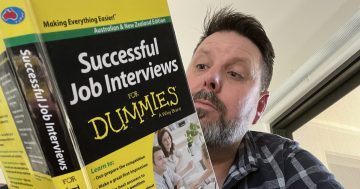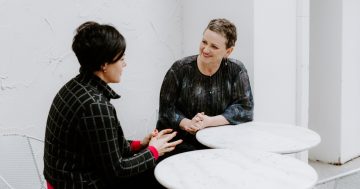With more people than ever thinking of changing jobs or even careers, Ashley Stahl* highlights some mistakes that can quickly sabotage a promising interview.
 With all the resume updates, networking events and hours you could spend submitting applications, the job hunt can be brutal.
With all the resume updates, networking events and hours you could spend submitting applications, the job hunt can be brutal.
By the time you finally get asked to come in for an interview, you’re not only tired, but your nerves have taken hold, and you’re only in the lobby.
Many clients have come to me for help after doing all the leg work to land interviews, only to walk into the room and unknowingly drop the ball.
Here’s the thing: Acing an interview largely comes down to having emotional intelligence, as well as recognising how you may be deterring the interviewer from hiring you.
Through the years I’ve spent coaching clients from all walks of the workforce, I have found these three common interview mistakes to be the reason for not getting hired.
Telling them everything
Many interviews start off with the really open-ended question: “Tell me about yourself.”
This can lead down a rabbit hole of simply regurgitating everything they could read at a glance of your resume.
Or, they ask you about a questionable career shift or a gap in your resume, which prompts you to reveal about the boss who fired you.
No matter how much of a connection you have with your interviewer, remember that over-sharing that early will come across as unprofessional.
This is about learning where you can walk the line of perhaps addressing a concern about your application versus shining a giant spotlight directly onto your weakness.
The best way to do this is to intentionally prepare your answers in advance to questions that you foresee in an interview.
Practice breeds certainty, and certainty breeds confidence, so be sure to practice and rehearse your answers.
This means looking in the mirror and practicing, or asking someone to sit down and host a mock interview with you as practice.
We live in a world where musicians have dress rehearsals, and movie actors shoot the same scene multiple times.
Who are you to think that you shouldn’t also be practicing for your interview performances?
Being cold or negative
An interview is a high-stakes experience that leads to being nervous and anxious.
What most people don’t realise is that anxiety can often be expressed as anger or negativity — the last kind of person an organisation wants.
Sometimes, the attempt to be professional appears cold, and it makes sense that mastering this state of being is challenging.
Remember to tune into your inner human that knows how to bond and connect with another.
Your personality, and being someone the interviewer sees themselves connecting with each day is what the interview conversation is really about.
Always remember, what you say about others says a lot about you.
It might be tempting to talk smack about an old boss or employer when answering an interview question, but it will only make you look bad.
People can intuitively tune into each other’s emotions, so if you are speaking poorly about someone else (or yourself), the person interviewing you is going to walk away feeling negative themselves.
In order to make sure your interviewer walks away with warm fuzzies, try sharing something personal about why the job aligns with your purpose or mission in the world.
This could be: “The reason this opportunity strikes a personal chord with me is…” and then share whatever it is that brings passion into your work.
Always remember to look them in the eye, and yes, amongst all the stress, don’t forget to smile and have a good time.
Being unaware of the organisation’s culture
It can begin to feel like you are spamming out applications; turning into a zombie in search of the right fit.
If you aren’t careful, you might walk into an interview unprepared to speak to the specific role and organisation.
Take the time to really do your research before you walk into the lobby for an interview.
This includes not only the job description and what the organisation does, but also getting a strong grasp on its culture.
We know the first impression matters, and part of that is what you wear.
It is never a good idea to show up casual to an interview, but it is in your best interest to know beforehand what the workplace environment is like.
Search through the organisations’ social media for any workplace images.
I am sure you can find pictures of employees at work events or walking through the campus.
This not only tells you what to wear, but also whether the culture aligns with what you are looking for.
During this search begin to compile a list of questions specific to the role and the organisation.
There is nothing more off putting for an interviewer than a candidate who has no questions.
“Do you have any questions for me?”
Don’t become a deer in headlights with this question, instead have a list prepared.
Having a few thoughtful questions will speak volumes about your interest in the role.
Always remember that as the person being interviewed, you are not calling the shots.
They brought you in to talk, so let them lead.
Save your inquiries for the end, when they open the floor for you to ask them questions.
The first step to anything is awareness.
Begin to pay more attention to what and how you handle interviews or practice interviews and take this learning into your next interview.
After all, being on the job hunt is not something you want to be doing forever.
*Ashley Stahl is a career coach, keynote speaker, podcast host and author. In a previous life she was award-winning counter-terrorism professional. She can be contacted at ashleystahl.com.
This article first appeared at forbes.com











